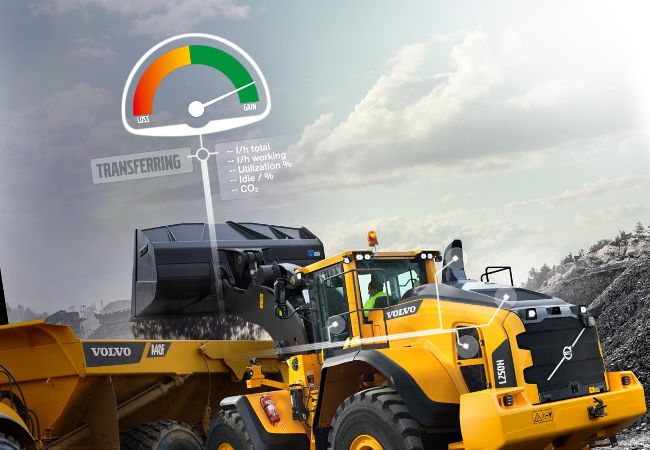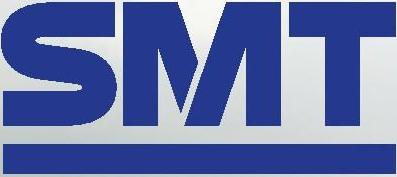SMT
OPTIMISING DIESEL NOW ELECTRIFYING TOMORROW
Volvo and SMT are partnering with customers to bridge the gap to zero-emission construction. Together, they’re implementing digital solutions that optimise diesel-powered equipment for lower fuel consumption and emissions today, while laying the groundwork for the practical and productive use of electric machines in the future.
Limiting the environmental impact of construction is no longer just the right thing to do; it’s crucial for success. Over the coming years, contractors will need to demonstrate emissions and waste reduction to win projects. Yet, expecting them to shoulder all responsibility isn’t realistic. Every link in the supply chain needs to do their bit and work together to succeed – with Volvo and SMT here to help.
SMT is proud to be the dealer for Volvo in Great Britain – a brand that has championed environmental care since the early 1970s and made impressive progress in developing hybrid and fully electric construction equipment. These innovations, when powered by renewable energy, hold the potential to slash contractors’ emissions.
That doesn’t mean SMT customers have to wait for emobility to start decarbonising, however. Even using diesel-powered equipment, SMT is collaborating with customers to boost the efficiency of their operations, lower fuel consumption, and make immediate reductions to their carbon footprint.
Maximising operational efficiency today is also important in the transition to emobility to avoid draining the batteries of electric construction equipment in the future. Inefficient operations could be a major barrier to uptime and productivity with electric machines, inevitably affecting project profitability and timelines, so contractors should start future-proofing their operations now.
DATA-DRIVEN DECISION-MAKING
The key to making tangible improvements to operations is digitalisation. Volvo CareTrack telematics data, accessible via the MySMT online portal, establishes a clear baseline understanding of the customer’s operating environment and fuel consumption. It enables SMT and customers to identify areas for improvement and measure the impact of interventions over time.
SMT’s Site Simulation service takes this a step further by integrating machine data with advanced drone surveying technology to create a virtual model of the customer’s jobsite. This digital twin enables simulations of various scenarios to determine the optimum machine numbers, types and specifications, as well as the optimal site layout and driving routes. The aim is to minimise idling and reduce travel distances, while meeting productivity goals effectively.
Looking ahead, Site Simulation can also play a pivotal role in planning the strategic placement and capacity of charging infrastructure for electric machines, when contractors feel the transition becomes viable for them.
UNLOCKING OPERATOR POTENTIAL
Besides fleet and site set-up, operator technique has a major impact on fuel consumption. An internal study by Volvo revealed significant variations in fuel efficiency among operators, with differences of up to 150% observed even among the most experienced participants. CareTrack data can, therefore, also identify opportunities for improvement with SMT’s EcoOperator training. This can be conducted on real machines or on simulators using Volvo R&D software that enable operators to hone their skills with zero emissions.
Learning needn’t be limited to courses, however. Volvo Co-Pilot with Load Assist, for example, includes an Operator Coaching app that offers real-time advice on the operator’s screen to adjust their technique for greater fuel efficiency and cement positive habits over time. Moreover, machine control systems in general – whether from the Volvo Co-Pilot Assist family or Unicontrol – help reduce fuel consumption by emphasising precision and productivity and minimising unnecessary work.
MAINTENANCE MADE EASY
Not only does the way a machine is operated affect fuel consumption and emissions, but its maintenance plays a crucial role as well. A well-maintained machine runs more smoothly and uses fuel more efficiently. If engine components such as air filters, spark plugs or fuel injectors, for example, become clogged or worn they can cause incomplete combustion, leading to wasted fuel and higher emissions. Insufficient lubrication of moving parts or inflation of tyres, meanwhile, increases friction, leading to both unnecessary wear and fuel consumption.


SMT ProCare is a 24/7 remote machine monitoring service that makes it easier for customers to stay on top of CareTrack machine data and keep equipment in optimum condition. Advanced algorithms sort through machine alerts, alarms, and fault codes, identifying probable causes and prioritising them according to severity so they can be addressed at the appropriate time. By proactively resolving minor issues before they can turn into serious and expensive problems, SMT ProCare safeguards against emissions spikes, as well as ensuring maximum uptime, productivity, and profitability.
CLICK TO VIEW VIDEOCLICK TO VIEW VIDEO
TAILORED CO2 REDUCTION SOLUTIONS
These examples showcase just a glimpse of the numerous interventions available to streamline operations, aiming to minimise environmental impact today while gearing up for electromobility tomorrow. Acknowledging the unique challenges and goals of each customer, SMT follows a systematic four-step process – Insight, Analyse, Improve, and Sustain – guiding customers to pinpoint and execute the most suitable solutions for their specific needs. In instances where a standard solution might not suffice, SMT and Volvo are dedicated to collaborating closely, crafting customised approaches to address customer requirements. Collaboration is paramount on the journey toward decarbonisation, and SMT and Volvo are committed to partnering with customers every step of the way.
Visit the SMT website to learn more about the dealer’s CO2 Reduction Solutions.